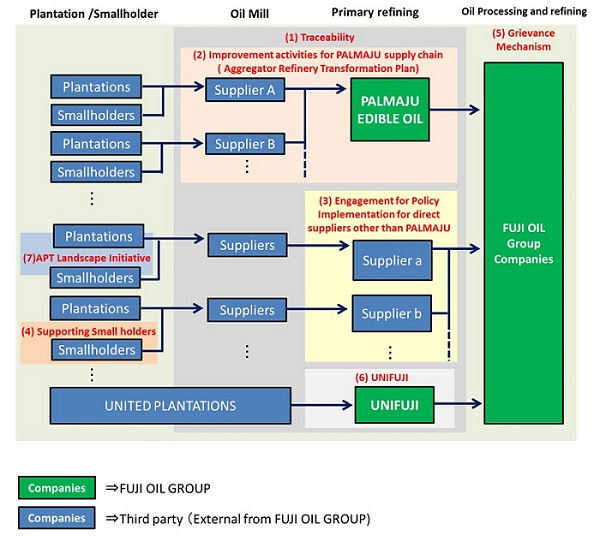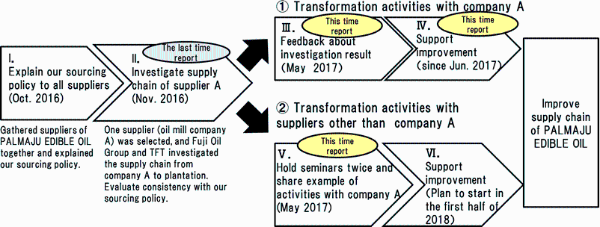News Release
News
FUJI OIL HOLDINGS
Progress report on responsible palm oil sourcing
2018.11.30
1. Purpose
Fuji Oil Group formulated and announced Responsible Palm Oil Sourcing Policy in March 2016. The Responsible Palm Oil Sourcing Policy commits itself to no deforestation, no peatland and no exploitation policy for all palm oil within our supply chain.
In this report, we will report the progress of initiatives to implement our sourcing policy since the previous report (June 2018).
2. Progress
FUJI OIL Group mainly promotes 6 activities as below figure 1 to carry out our responsible palm oil sourcing policy.
Figure 1: Total picture of main activities to improve the responsible palm oil sourcing policy

(1)Traceability
Our Group is working to figure out traceability to grasp and improve the supply chain. We aim to achieve full traceability to oil mills for all palm oil purchased and processed across the Group by 2020.
We have achieved a global palm oil traceability score of 98% in the period from January 2018 - June 2018, which has increased 3% as compared with last reporting period. This refers to a global average of 97% for all Palm Oil (PO) and 100% Palm Kernel Oil (PKO) products.
Transition of traceability score to oil mills(%)
| January 2018 - June 2018 | July 2017 - December 2017 | January 2017 - June 2017 | July 2016 - December 2016 | |
|---|---|---|---|---|
| Palm Oil | 97 | 96 | 96 | 93 |
| Palm Kernel Oil | 100 | 94 | 97 | 96 |
| Total | 98 | 95 | 96 | 94 |
Although the score varies depending on each region, the Group as a whole managed to maintain the consistency of Palm Oil sourcing score compared with the previous reporting period (July 2017 - December 2017). This is mainly due to the continuous effort in strengthening the communication with suppliers in all Fuji Oil sourcing regions. Fuji Oil fully commits to supply chain transparency as stated in our Responsible Palm Oil Sourcing Policy. Hence, we decided to stop provisional traceability. We will continue to strengthening engagement with suppliers towards improving the traceability score.
Note on results
- ・Traceability levels may vary over time due to data availability, changes in sourcing or other issues.
- ・All traceability numbers are based on self-disclosed information provided by our suppliers. In some cases, the GPS coordinates of mills were shared with our partner TFT and not directly with Fuji Oil.
- ・Some mill data is bound to NDA’s between TFT and our suppliers, while plans for Fuji Oil Group to hold this data are being developed.
(2)Improvement activities for PALMAJU supply chain
ART (Aggregator Refinery Transformation) Plan
Since July 2016, we have been partnering with TFT (The Forest Trust) a global not-for-profit organization in the Responsible Palm Oil Sourcing Policy implementation. As part of the policy implementation strategy, we have initiated an ART (Aggregator Refinery Transformation) plan for Crude Palm Oil (CPO) and Palm Kernel Oil (PKO) suppliers in the supply chain of PALMAJU EDIBLE OIL SDN BHD, in which PALMAJU is one of our group companies and one of the 1st refineries in Malaysia.
Please see our progress article below:
http://www.tft-earth.org/stories/blog/fuji-oil-bringing-change-malaysian-palm-oil/

As shown in the above figure 2, as of November 2018, we conduct two types of activities: "① Transformation activities with company A" and "② Transformation activities with suppliers other than company A"
① Transformation activities with company A
Please refer to the video link below for the achievements we did with company A:
https://www.youtube.com/watch?v=sUWBgu07Tp8
For further information about transformation activities with company A, please refer to our previous Progress Report dated 6th June 2018 as stated below:
https://www.fujioilholdings.com/en/news/2018/1193705_2696.html
With the outstanding progress and commitment shown by company A, they were invited to Pioneer’s Forum, to share their progress and achievements towards Fuji Oil Responsible Palm Oil Sourcing Policy. Pioneer’s Forum is an initiative by our working partner – TFT to provide platform for forward thinking companies such as plantation, oil mills and refineries to share their transformation journey and as well as their good practices on the ground. We are proud that company A was invited as one of the representatives from the industry to attend this forum.
Please refer to the below for more information:
https://sway.com/pLEOS156F4OgnrC7
② Transformation activities with suppliers other than company A
As we reported in our previous Progress Report, we held a one-day seminar for suppliers other than company A (oil mill). At the seminar, we reinstated our sourcing policy commitment and made requests to the suppliers to use the online system called Tools for Transformation – Self Assessment (T4T Self-Assessment) which is developed by our working partner – TFT. Most of the suppliers participated in the seminar have an improved understanding of NDPE (No Deforestation, No Peat, No Exploitation).
T4T Self-Assessment is a tool to help palm oil suppliers to self-assess and understand where they stand against Fuji Oil Responsible Palm Oil Sourcing Policy requirements (No Deforestation, No Peat, No Exploitation). T4T Self-Assessment is useful to both suppliers and Fuji Oil to understand the supplier’s current status vis-à-vis Fuji Oil Policy by sending out the questionnaire and answered by suppliers.
In the past 6 months, efforts had been putting into engaging with PALMAJU’s suppliers about T4T Self-Assessment. As of November 2018, all PALMAJU’s direct suppliers (7 oil mills) have responded by submitting their questionnaire in the system including company A. We will continue our effort in engaging more suppliers to participate in T4T Self-Assessment. For the coming year, we will further study the result to give further support to our suppliers in producing Deforestation and Exploitation free palm oil.
(3)Engagement for Policy Implementation (EPI) for direct suppliers other than PALMAJU - Refineries
Other than palm oil mills, Fuji Oil Group also committed to engage with different category of suppliers, in this case refineries, to understand their supply chain progress toward implementing Responsible Sourcing Policy with EPI. EPI is a process for understanding where suppliers are in their transformation journey and in meeting our policy, and for supporting suppliers in that journey through regular updates. The EPI template is used for direct suppliers, refineries, to communicate the current status of their transformation or compliance efforts, and to capture progress over time. The template covers a range of topics considered to be important to implementing a robust responsible sourcing program. The EPI questionnaire covers six main topics relevant to achieving transformation in the palm oil supply chain: ・Company Policy Commitment
・Traceability Status
・Approaches to Changing Practices
・Global Grievance Mechanism & Non-Compliant Supplier Process
・Transparency
・Verification
As of November 2018, Fuji Oil Group has engaged with all direct suppliers (22 refineries) globally by sending out the EPI questionnaire. We encourage our suppliers to answer openly and accurately, which will allow us to better identify and address gaps in order to support our suppliers in progressing towards policy compliance. Our follow up with each supplier will be based on the initial supplier responses to the EPI questions.
(4)Supporting smallholders
The challenge for palm oil smallholders is that sustainable farm management is difficult due to lack of available knowledge. Fuji Oil Group supports smallholders in Kinabatangan of Saba, Malaysia as a member of Wild Asia Group Scheme (WAGS) with our supplier from January 2016. WAGS is an initiative established by Wild Asia, an Malaysian NGO, to increase both productivity and awareness for sustainable management of smallholders. By Oct 2018, about 520 small producers in Kinabatangan are supported by WAGS and 15,000mt of FFB (Fresh Fruit Bunch for Palm Oil) are RSPO Certified.
We will continue the support as a member of WAGS.
(5)Grievance Mechanism
We have established and published our grievance mechanism to carry out our NDPE policy.
The Grievance procedure and Grievance list have been published on our Grievance WEB site as stated below:
https://www.fujioilholdings.com/en/csr/grievance_mechanism/
We update the Grievance list as frequent as quarterly basis.
(6) UNIFUJI
UNIFUJI is a joint venture with a plantation company, UNITED PLANTATIONS, which shares the same value towards sustainable prantices of palm oil production. UNIFUJI produces high value-added palm oil products by sustainable palm oil from UNITED PLANTATIONS and fractionation technology of FUJI OIL group. It has started commercial operations in the second half of 2018.
(7)APT Landscapes Initiative – Indonesia
In 2017, our partner TFT launched the Areal Prioritas Transformasi (APT) or Priority Transformation Areas initiative in Indonesia. The initiative takes a ‘landscape approach’ to addressing the competing interests of stakeholders in ecologically significant areas of Indonesian Sumatra that are a risk of deforestation from palm oil expansion. These areas have been defined and selected based on their importance as key forest and habitat areas that are under threat from accelerating rates of deforestation. Fuji Oil Group has started to support APT Landscape Initiative since April 2018 because these important areas are in our supply chain. The goal of the APT work in Indonesia is to support government land use planning processes and leverage our supply chains connections in order to ensure that land is managed in a way that responds to local environmental, social and economic needs..
As one of the key funders in this initiative, we are proud to announce that APT Programme is making progress in achieving its key objectives as below:
- ・Getting the local government involved as a key leader in economic and spatial planning
- ・ Putting in place conditions that will stop deforestation inside oil palm concessions
- ・Preventing other deforestation outside of concessions due to oil palm plantation expansion by ensuring community-based conservation that provides smallholders alternative livelihood options
- ・Strengthening current practices of mills and plantations to implement or strengthen NDPE commitments
The APT Programme is currently operating in three landscapes where Indonesia’s precious tropical forests are threatened due to expanding agriculture, which includes two landscapes in Aceh, home to the Leuser Ecosystem and the last place on earth where orangutans, tigers, elephants and rhinoceroses still co-exist.
Please refer to the report below for further information:
https://drive.google.com/file/d/1MGHogrfGx54WpIHeM2O7es10ib5jDHAV/view
3. Next steps
Together with our partners we will continue our effort in implementing our responsible sourcing policy. The ART plan will be continued, and we have progressed to introducing T4T Self-Assessment to engage with larger amount of suppliers. The tool would facilitate our engagements with suppliers effectively based on the result from the questionnaire. We plan to distribute T4T Self-Assessment to the indirect suppliers (oil mills) and even plantations, in the second half of 2018. We will engage with our refinery suppliers based on the EPI responses. On top of this, all raised grievances will be managed and monitored through our Grievance Procedure. All raised grievances against Fuji Oil Group will be listed in our Grievance List after verification. Fuji Oil Group also will continue to update our traceability report publicly on a half-yearly basis.
In order to better communicate our progress toward our Responsible Palm Oil Sourcing Policy, we will develop a roadmap/time bound action plan to demonstrate our strategies in implementing our policy. Impacts/outcomes will be documented for communication purpose. Please stay tune for further information in our next progress report which will be released in June 2019 along with our activities on palm oil sustainability.
End of report